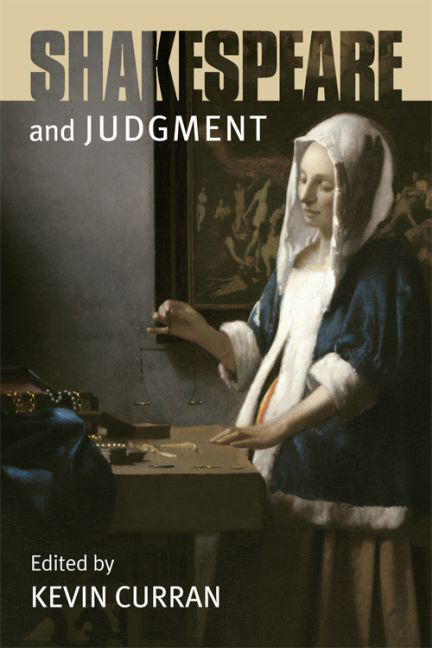Book contents
- Frontmatter
- Contents
- Acknowledgments
- List of Contributors
- Introduction
- Part I Staging Judgment: Deliberation in the Plays
- Part II Audience Judgment: Deliberation in the Theater
- 4 “Gently to hear, kindly to judge”: Minds at Work in Henry V
- 5 “Practis[ing] judgment with the disposition of natures”: Measure for Measure, the “Discoursive” Common Law, and the “Open Court” of the Theater
- 6 The Laws of Measure for Measure
- 7 Prospero's Plea: Judgment, Invention, and Political Form in The Tempest
- Part III The Ethics of Judgment
- Index
6 - The Laws of Measure for Measure
from Part II - Audience Judgment: Deliberation in the Theater
Published online by Cambridge University Press: 10 May 2017
- Frontmatter
- Contents
- Acknowledgments
- List of Contributors
- Introduction
- Part I Staging Judgment: Deliberation in the Plays
- Part II Audience Judgment: Deliberation in the Theater
- 4 “Gently to hear, kindly to judge”: Minds at Work in Henry V
- 5 “Practis[ing] judgment with the disposition of natures”: Measure for Measure, the “Discoursive” Common Law, and the “Open Court” of the Theater
- 6 The Laws of Measure for Measure
- 7 Prospero's Plea: Judgment, Invention, and Political Form in The Tempest
- Part III The Ethics of Judgment
- Index
Summary
Near the end of Measure for Measure, a woman kneels before a judge and pleads for the life of the man who has dishonored her and who (she believes) has had her brother beheaded. She performs this extraordinary action for a number of reasons – to give the condemned man another chance to be better than he has been, to assure that the condemned man's new wife will not be made a new widow, and, finally, to honor what she evidently believes is the cause of justice.
In the moments that follow and that close the play, the urgency, complexity, and gravity of the woman's plea are washed away by a flood of what are supposed to pass as acts of mercy, but which are so indiscriminate as to be empty of moral weight altogether. Then, without a scintilla of warning, the judge, who is scattering his acts of mercy wildly among almost everyone on the stage, turns and asks the woman to marry him. It is as if a severe stone statue facing us were suddenly revealed to be a helium-filled balloon. The action and meaning of the play float crazily away.
Why does the play swing from the seriousness of Isabella's plea to the weirdly profligate forgivings that Vincentio showers on all? To answer this question, we will have to consider how the play develops a critical representation of three kinds of law, each one having its own special relationship with the ideal of justice. At the end, we will come back to Isabella. To a considerable degree, Isabella is us – the figure of how the play summons its audiences and readers to the labor of judgment, situates our judging apart from the machinations of the powerful, characterizes theater-born judging as a form of serious play (after all, Isabella has not been raped by Angelo, her brother has not been killed), and reveals the stakes of judgment for the judges themselves. But first, let us look again at the play's ending.
- Type
- Chapter
- Information
- Shakespeare and Judgment , pp. 139 - 156Publisher: Edinburgh University PressPrint publication year: 2017



